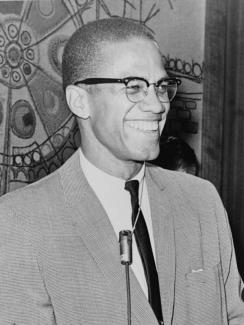Malcolm X, A Transformative Figure in Civil Rights

Photo by Ed Ford, New York World-Telegram and the Sun Newspaper / Library of Congress
Malcolm X, 1964
In May, we remember the life and lasting impact of Malcolm X, a towering figure in the struggle for civil rights and racial justice. Born on May 19, 1925, Malcolm X's journey from adversity to advocacy is a testament to his enduring commitment to challenging racism and structures of inequality.
Malcolm X, born Malcolm Little, endured a tumultuous upbringing marred by systemic racism and violence. Growing up in Omaha, Nebraska, he witnessed firsthand the pervasive discrimination faced by African Americans. His father's tragic death, likely a result of racial violence, deeply impacted Malcolm and influenced his future activism.
Malcolm X's path to prominence began during his incarceration for robbery (from 1946 to 1952), where he discovered the teachings of the Nation of Islam and its leader, Elijah Muhammad. Embracing the Nation's ideology of black empowerment and self-determination, Malcolm X emerged as a passionate advocate for racial pride and separatism. His adopted surname of “X” signified his lost ancestral surname.
Known for his strong speech skills and uncompromising stance against white supremacy, Malcolm X galvanized audiences across the United States . His speeches, including the iconic “The Ballot or the Bullet,” challenged America's racial hierarchy and called for radical change.
Malcolm X's worldview evolved following a pilgrimage to Mecca in 1964, where he experienced a transformative spiritual awakening. Embracing a more inclusive vision of humanity, he renounced his earlier separatist beliefs and embraced a broader struggle for human rights.
Tragically, Malcolm X's life was cut short on February 21, 1965, when he was assassinated at the Audubon Ballroom in New York City. Despite his untimely death, Malcolm X's legacy endures as a beacon of courage and resistance against racism.
Malcolm X's journey demonstrates the transformative power of resilience and education in the face of systemic oppression. His unwavering commitment to combating racism continues to inspire generations of activists in the ongoing quest to end racism.
